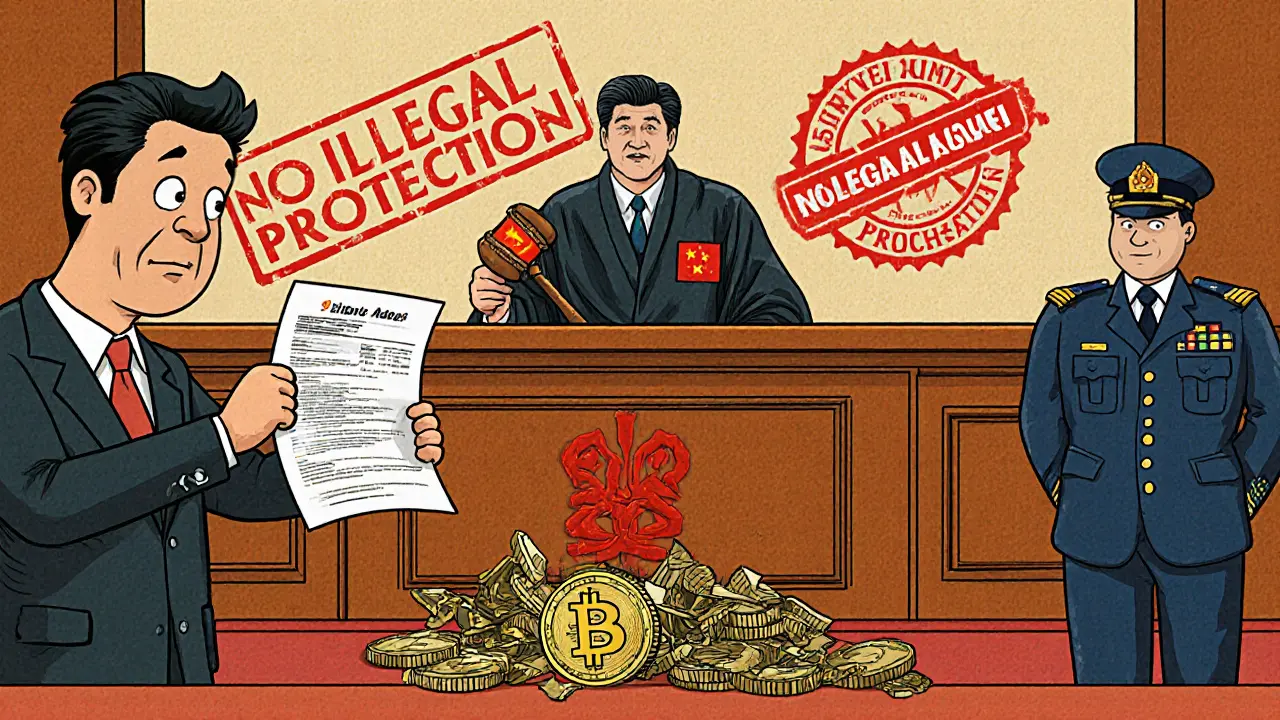Chinese Crypto Legal Risk Assessment
This tool assesses the legal risk level of cryptocurrency activities in China based on current regulations as of 2025. Understanding your risk level helps you make informed decisions about holding and using crypto in the country.
By 2025, an estimated 58 million Chinese citizens still hold cryptocurrency-despite it being officially illegal. That’s more than the entire population of Canada. But here’s the catch: if your Bitcoin gets stolen, your Ethereum gets frozen, or a scammer walks off with your wallet, you have no legal recourse. Not in court. Not with the police. Not even with your bank. China doesn’t protect your crypto. It doesn’t recognize it as property. And yet, millions hold it anyway.
It’s Illegal to Hold Crypto in China-But No One’s Arresting You
Since September 2021, the Chinese government declared all cryptocurrency transactions illegal. That includes trading, mining, and even using crypto to pay for goods. In 2025, the rules got even stricter: a nationwide ban on private crypto ownership took effect on June 1, making it illegal to hold digital assets at all. But here’s the twist-no one’s going door-to-door to confiscate your wallet. The state doesn’t actively hunt down individual holders. If you bought Bitcoin in 2020 and still have it tucked away in a hardware wallet, you’re not likely to face criminal charges. That’s not because it’s legal. It’s because enforcement focuses on businesses, not individuals. The crackdown targets exchanges, mining farms, and anyone running crypto-related services. The government wants to kill the infrastructure, not the users. But that doesn’t mean you’re safe. If you’re caught using crypto to move money out of the country, evade taxes, or fund illegal projects, you could face serious penalties-including prison time. The line between personal holding and criminal activity is blurry, and the state doesn’t care where you draw it.July 2025: Did China Legalize Crypto? The Confusion Explained
On July 11, 2025, headlines exploded: “China Recognizes Bitcoin as Legal Property.” It sounded like a reversal. A breakthrough. A crack in the wall. But it wasn’t. What actually happened? A court in Shanghai ruled that a private contract involving Bitcoin transfer could be acknowledged as evidence in a civil dispute-not because Bitcoin was legal, but because the contract itself had been signed and executed. The court didn’t say crypto is money. It didn’t say you can sue to recover stolen coins. It just said, “This document exists, and we can look at it.” This is a legal technicality, not a policy shift. Chinese courts still refuse to enforce crypto-related claims. If you lost money in a Ponzi scheme disguised as a crypto investment, the court will dismiss your case. Why? Because the underlying asset-crypto-is illegal. No legal protection means no legal remedy. The confusion came from media misreading a narrow judicial observation as a national policy change. In reality, the state’s position hasn’t budged: crypto is a virtual commodity, not an asset, not money, not property under the law.What Happens If You Get Scammed?
Let’s say you sent 5 BTC to a fake exchange. You thought it was real. You lost $200,000. You go to the police. You file a report. What happens next? Nothing. Chinese authorities won’t investigate crypto fraud unless it’s tied to money laundering, illegal fundraising, or cross-border capital flight. Even then, they won’t recover your coins. They’ll freeze the suspect’s bank account, but your Bitcoin? Gone. Forever. There’s no crypto recovery service. No consumer protection agency. No insurance fund. The state has made it clear: if you choose to play in this space, you’re on your own. No one’s coming to save you. This isn’t just about scams. It’s about every risk: exchange hacks, wallet errors, phishing attacks, lost private keys. If you mess up, you lose everything-and the law won’t help you fix it.
Trading, Mining, and Exchanges: The Complete Ban
China shut down its last major centralized exchange in 2017. Since then, platforms like Binance and OKX have been blocked. You can’t open a crypto account at Bank of China. You can’t use Alipay or WeChat Pay to buy Bitcoin. Any service offering crypto trading, staking, or lending is illegal. Mining? Banned. All of it. In 2021, China shut down 90% of the world’s Bitcoin mining operations. By 2025, even small-scale miners using home rigs are targeted. The government says it’s about energy waste. The real reason? Control. Mining decentralizes power. China wants centralized control over money. The only legal way to access crypto now is through offshore platforms using VPNs. But using a VPN to bypass internet restrictions is itself a violation of Chinese internet regulations. So you’re breaking two laws just to hold something the state says doesn’t exist.The Digital Yuan: China’s Real Crypto
While private crypto is banned, China is building its own digital currency: the e-CNY, or digital yuan. It’s not blockchain. It’s not decentralized. It’s not anonymous. It’s a state-controlled digital cash system with full traceability. The government is rolling out e-CNY wallets in over 200 cities. People use it to pay for groceries, buses, and utility bills. Every transaction is logged. The state knows who paid whom, when, and how much. This is the opposite of Bitcoin. Bitcoin is about freedom from control. The digital yuan is about total control. China isn’t trying to ban crypto because it’s dangerous. It’s banning crypto because it can’t control it. The e-CNY is the future. Not Bitcoin. Not Ethereum. Not Solana. The government’s entire tech strategy is built around digital currency that serves the state-not the user.
What About Foreigners in China?
If you’re an American, German, or Australian living in Shanghai, the rules are the same. You can’t buy crypto on a local exchange. You can’t mine it. You can’t use it to pay for services. Even if you brought your wallet with you from abroad, using it locally is illegal. The ban applies to everyone in China’s territory. No exceptions. No diplomatic immunity. No tourist loophole. If you’re physically in China, you’re subject to Chinese law-even if you’re just visiting for a week.The Gray Zone: Holding Crypto Without Getting Caught
Most Chinese crypto holders operate in a gray zone. They don’t trade. They don’t mine. They don’t promote it. They just hold. They store coins in cold wallets. They avoid talking about it. They don’t link their bank accounts to crypto platforms. It’s risky, but it’s common. Some hold as a hedge against inflation. Others see it as a form of digital savings. A few believe it’s the only way to preserve wealth outside the state’s control. But here’s the truth: this isn’t a strategy. It’s a gamble. The law can change overnight. In 2025 alone, there were three major policy shifts-all conflicting. One day, crypto is illegal. The next, a court acknowledges a contract. The next, a new circular bans all crypto-related data transfers. There’s no playbook. No legal advice that’s safe. No expert who can guarantee you won’t get punished tomorrow.The Bottom Line: No Protection, Just Risk
Chinese crypto holders are in a unique position. They’re among the largest group of crypto owners in the world. But they have zero legal rights. No courts will help them. No regulators will protect them. No banks will serve them. The state doesn’t want you to use crypto. It doesn’t want you to own it. It just hasn’t figured out how to take it from you yet. If you’re holding crypto in China, you’re doing it at your own risk. Not because it’s too dangerous. But because the system was designed to leave you exposed. There’s no future for private cryptocurrency in China. Only the digital yuan. And that’s not freedom. It’s surveillance with a better interface.Is it legal to hold Bitcoin in China in 2025?
No, it’s not legal. Since June 1, 2025, holding cryptocurrency is officially banned under Chinese law. However, enforcement targets businesses and services-not individual holders. While you won’t be arrested just for owning Bitcoin, you have no legal protection, and any related activity (like trading or using it to send money) can lead to penalties.
Can I sue if my crypto is stolen in China?
No. Chinese courts refuse to hear cases involving cryptocurrency losses because the asset itself is considered illegal. Even if you have proof of theft, the court will dismiss your claim. There is no legal recourse for stolen crypto, hacked wallets, or scam losses in China.
What happens if I use a VPN to access crypto exchanges?
Using a VPN to access foreign crypto exchanges violates China’s internet regulations. While many people do it, it’s still illegal. If caught, you could face fines, account freezes, or restrictions on your internet access. It doesn’t make crypto ownership legal-it just adds another layer of risk.
Is mining cryptocurrency still allowed in China?
No. All cryptocurrency mining was banned nationwide in 2021, and enforcement has only tightened since. Any mining operation, even small-scale home rigs, is illegal. Authorities have shut down thousands of facilities, and new mining is actively monitored and blocked.
Can I use cryptocurrency to pay for goods in China?
No. No business in China is allowed to accept cryptocurrency as payment. This includes online stores, restaurants, and even private sellers. Doing so is classified as an illegal financial activity and can result in fines or legal action against the merchant-and potentially you, the buyer.
Will China ever legalize Bitcoin again?
It’s extremely unlikely. China’s goal is not to regulate crypto-it’s to replace it. The government is heavily investing in the digital yuan (e-CNY), a centralized digital currency it fully controls. Private, decentralized cryptocurrencies like Bitcoin are seen as threats to financial sovereignty. There’s no indication the state plans to reverse course.


Louise Watson
November 7, 2025 AT 16:24So you're telling me holding crypto in China is like keeping a grenade in your pocket-no one’s gonna pull the pin… until they decide to.
Benjamin Jackson
November 7, 2025 AT 19:18It’s wild how people still hold it. Like keeping a secret diary in a totalitarian library. You know it’s dangerous, but you just… need to keep it.
Liam Workman
November 8, 2025 AT 23:04China’s playing 4D chess while the rest of us are still trying to understand checkers. 🤔 They don’t ban crypto because it’s evil-they ban it because it’s *free*. And freedom? That’s the real threat.
The digital yuan isn’t progress-it’s a leash with a touchscreen.
Wendy Pickard
November 9, 2025 AT 02:05I can’t imagine living under that kind of uncertainty. Just holding something you can’t talk about, can’t protect, and could lose overnight.
Jeana Albert
November 10, 2025 AT 20:23Of course they don’t arrest people-they’re too busy arresting journalists and dissidents. Crypto holders? They’re just collateral damage in the grand scheme of control. Pathetic.
Natalie Nanee
November 12, 2025 AT 18:04People who hold crypto in China are either idiots or heroes. There’s no middle ground. You’re either blind to the risks or brave enough to defy a state that wants you to be powerless.
Angie McRoberts
November 14, 2025 AT 11:40So… you’re telling me the entire Chinese crypto scene is just one giant, silent, high-stakes poker game where the house always wins?
And we all thought Vegas was risky.
Chris Hollis
November 16, 2025 AT 03:0058 million people holding something illegal. That’s not a movement. That’s a statistic waiting to be corrected.
Diana Smarandache
November 16, 2025 AT 19:16China’s policy is not inconsistent-it’s deliberately ambiguous. That’s how authoritarian systems maintain control: by keeping everyone in a state of perpetual uncertainty.
Pranjali Dattatraya Upadhye
November 18, 2025 AT 16:44It’s like having a secret love affair with a forbidden fruit-tastes amazing, but one wrong move and your whole life burns down. Still… worth it sometimes, right? 🍎💔
Tara R
November 20, 2025 AT 05:37The idea that anyone would risk their freedom for Bitcoin is beyond naive. If you can’t trust the state to protect your wealth then you shouldn’t have any wealth to begin with
Michelle Stockman
November 21, 2025 AT 14:10Wow. So China’s just… winning? By not even trying? Brilliant. I’m so impressed.
Brian Webb
November 22, 2025 AT 03:28I get why people hold it. It’s not about money-it’s about having something the state can’t track, can’t control, can’t take. Even if it’s illegal… it’s still yours.
That’s powerful. Even if it’s dangerous.
Whitney Fleras
November 22, 2025 AT 07:23It’s heartbreaking to think that so many people are risking everything just to keep a digital asset safe. No one should have to live like that.
Colin Byrne
November 23, 2025 AT 05:59Let’s not romanticize this. The fact that 58 million people are holding crypto in China doesn’t mean they’re rebels-it means they’re ignorant of the legal consequences, or worse, they’re delusional about the system’s tolerance. The state doesn’t care about your personal beliefs. It cares about control. And control is absolute. Any notion otherwise is a fantasy fueled by crypto bro propaganda and misplaced idealism.
There’s no ‘gray zone’-there’s only a ticking time bomb with a name and ID number attached. The moment the state decides to enforce the law, it won’t be a surprise. It’ll be a purge.
And when that happens, don’t come crying to the internet about how ‘unfair’ it is. You knew the rules. You chose to break them. That’s not courage. That’s recklessness dressed up as philosophy.
The digital yuan isn’t the enemy-it’s the inevitable outcome of a civilization that prioritizes order over chaos. Bitcoin? It’s a relic. A beautiful, anarchic relic. But relics don’t survive in centralized systems. They get archived. Or erased.
So yes, hold your coins. Hide them in cold storage. Whisper about them in dark rooms. But don’t pretend you’re part of some grand resistance. You’re just a footnote in a bureaucratic footnote.
John Doe
November 24, 2025 AT 01:14They’re not just banning crypto-they’re building a surveillance state that tracks your every move. The digital yuan? It’s not money. It’s a tracking chip you carry in your phone. And soon, if you buy coffee with Bitcoin? They’ll know. And then… you disappear.
They’ve already started blocking VPNs. Next? Your phone gets flagged. Then your bank account. Then your job. Then your family. This isn’t about finance. It’s about total control. And we’re all just waiting for the other shoe to drop.
Don’t believe me? Look at what happened to Uyghurs. Look at how fast dissent vanishes. Crypto is just the next target. They don’t want you to have freedom. They want you to be quiet. And if you’re not quiet? You’re not a citizen. You’re a problem.
And guess what? The moment they find your wallet? They won’t arrest you. They’ll just… make you vanish. No trial. No media. No headlines. Just silence.
So yeah. Keep your Bitcoin. But know this: you’re not holding wealth. You’re holding a death sentence.
Ryan Inouye
November 25, 2025 AT 18:12Of course China bans crypto. It’s a Western tool for destabilization. The digital yuan is the future of sovereignty. Anyone who thinks otherwise is either a traitor or a fool.
Finn McGinty
November 27, 2025 AT 00:39Let me be clear: this isn’t about law. It’s about power. The Chinese government doesn’t fear Bitcoin because it’s volatile. It fears it because it’s untraceable. It’s anonymous. It’s outside their control. And in a regime that equates control with stability, that’s an existential threat.
They don’t need to arrest millions. They just need to make the cost of holding it unbearable. That’s what they’re doing. The fines. The blocked accounts. The internet restrictions. The social stigma. The fear. It’s psychological warfare dressed as regulation.
And here’s the cruel twist: the people holding crypto aren’t criminals. They’re just ordinary citizens trying to preserve something-savings, autonomy, hope-in a system that offers none of those things.
But the state doesn’t care about their humanity. It cares about its monopoly. So it creates a world where you can own something… but not protect it. Where you can have wealth… but not justice. Where you can have freedom… but not safety.
This isn’t a policy failure. It’s a design feature.
And the most terrifying part? It’s working. People are still holding. But they’re holding in silence. In shadows. In fear. And that silence? That’s the victory.
The digital yuan isn’t the future of money. It’s the future of obedience.